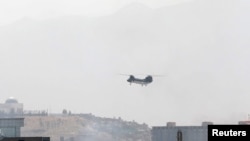Just weeks before the United States was set to complete its military withdrawal from Afghanistan, military commanders surged hundreds more troops to Kabul saying the goal is now to evacuate U.S. diplomats and Afghan allies, following a swift takeover of the capital by Taliban insurgents.
A U.S. defense official confirmed to VOA late Sunday that the U.S. was sending another 1,000 soldiers from the 82nd Airborne Brigade Combat Team to Kabul’s Hamid Karzai International Airport, where U.S. government officials, civilians and Afghans were taking refuge from the Taliban advance.
The new troops join another 1,000 soldiers from the 82nd Airborne rerouted to Kabul from Kuwait, where they had initially planned to be on standby, and another 3,000 Marine and Army infantrymen who began arriving in the Afghan capital on Friday. About 1,000 U.S. troops hadn’t left Afghanistan yet.
The new deployments bring the total number of troops in Afghanistan to about 6,000, almost three times as many as when the U.S. withdrawal began in May.
Initially, a U.S. official, speaking on the condition of anonymity, told VOA that American forces had firm control of both the U.S. Embassy in Kabul and the airport. But within hours, the airport was coming under fire.
U.S. troops, the official said, were “trying to take care of it.”
By late Sunday, the Pentagon said it had taken over air traffic control at the airport with the help of some Afghan forces.
“Commercial traffic continues, though it has experienced some sporadic stoppages and delay,” Pentagon press secretary John Kirby said in a statement to VOA.
“Several hundred civilians including personnel and private U.S. citizens have been evacuated so far,” he said, adding, “We continue to build capacity to expedite processing for at-risk Afghan civilians.”
Kirby also warned that, “Any threat posed to the mission will be taken seriously — and any attack on our people or on our operation will be met forcefully.”
State Department spokesman Ned Price said in a statement late Sunday that “the safe evacuation of all Embassy personnel is now complete,” and that all staff had been taken to the airport where the perimeter was secured by the U.S. military.
A separate, joint statement from the Pentagon and the State Department, also issued late Sunday, said the U.S. “will be transferring out of the country thousands of American citizens who have been resident in Afghanistan, as well as locally employed staff of the U.S. mission in Kabul and their families and other particularly vulnerable Afghan nationals.”
It also said the U.S. is accelerating the evacuation of thousands of Afghans eligible for U.S. Special Immigrant Visas.
“For all categories, Afghans who have cleared security screening will continue to be transferred directly to the United States,” it said. “And we will find additional locations for those yet to be screened.”
NATO on Sunday also began focusing its efforts on the airport, though it said it was also seeking to maintain a diplomatic presence in Kabul.
“We are helping to maintain operations at Kabul airport to keep Afghanistan connected with the world,” a NATO official told VOA.
Spoke with #UK PM @BorisJohnson and the Foreign Ministers of our Allies #Canada, #Denmark and #Netherlands on the situation in #Afghanistan. #NATO is helping keep Kabul airport open to facilitate and coordinate evacuations.
— Jens Stoltenberg (@jensstoltenberg) August 15, 2021
As the fall of Kabul to the Taliban played out on the ground and with a dizzying array of statements on social media, U.S. President Joe Biden stayed at Camp David, a presidential retreat outside of Washington, where he was updated on the quickly deteriorating situation.
“This morning, the president and vice president met by secure videoconference with their national security team to hear updates on the drawdown of our civilian personnel in Afghanistan, evacuations of SIV (Special Immigrant Visa) applicants and other Afghan allies, and the ongoing security situation in Kabul,” a White House official told VOA, requesting anonymity due to the sensitive nature of the situation.
Blinken on Taliban advances
Meanwhile, the administration’s top diplomat promised the U.S. was making the safety of U.S. personnel and Afghan helpers “job No. 1,” calling the collapse of Kabul “heart-wrenching stuff.”
The U.S. will "do everything we possibly can for as long as we can to get them out if that's what they want," Blinken told CNN’s State of the Union early Sunday.
Blinken also defended the Biden administration’s decision to move forward with the withdrawal, warning that the other option would have been a renewed war with the Taliban that would have required the U.S. to send in “tens of thousands” of additional forces given “the hollowness of the Afghan security forces.
US intelligence
While the speed of Afghanistan’s collapse may have caught some by surprise, U.S. intelligence officials pushed back, telling VOA that analysts “have always been clear-eyed that this was possible.”
“We have noted the troubling trend lines in Afghanistan for some time, with the Taliban at its strongest, militarily, since 2001,” a senior intelligence official told VOA, speaking on the condition of anonymity because of the nature of the assessments.
“The question all along was whether the Afghan government and military would be cohesive enough and have the willpower needed to exercise its military capabilities to resist the Taliban,” the official added. “As the Taliban advanced, they ultimately met with little resistance.”
US lawmakers react
Some lawmakers Sunday reacted angrily to the collapse of the U.S.-backed Afghan government, many directing their anger at the White House.
“The unmitigated disaster in Afghanistan — the shameful, Saigon-like abandonment of Kabul, the brutalization of Afghan women, and the slaughter of our allies — is the predictable outcome of the Trump-Biden doctrine of weakness,” Ben Sasse, a Republican member of the Senate Intelligence Committee, said in a statement.
“History must be clear about this: American troops didn’t lose this war — Donald Trump and Joe Biden deliberately decided to lose,” Sasse added.
Biden’s withdrawal plan is a continuation of a proposal set in motion by his immediate predecessor, Donald Trump. The Trump administration negotiated a deal with the Taliban in February 2020, setting a timetable for the withdrawal of U.S. troops in Afghanistan in return for the insurgents ending attacks on Americans and entering into talks with the Afghan government.
The top Republican on the House Foreign Affairs Committee said Sunday the onus falls squarely on the Biden administration.
“They totally blew this one. They completely underestimated the strength of the Taliban,” Representative Michael McCaul told CNN’s State of the Union. “They didn’t listen to the intelligence community because every time I got an I.C. briefing assessment it was probably the grimmest assessment I’ve ever heard on Afghanistan.”
Some Democrats, however, pushed back.
“Had Biden decided to abandon the agreement negotiated by President Trump, the U.S. would have had to surge thousands of additional troops into Afghanistan,” Senator Chris Murphy tweeted, following a briefing from both Blinken and Austin.
“The 2,500 that Trump had left were not nearly enough,” Murphy added.
Still, outside observers cautioned that the fallout from Afghanistan could have a lingering impact on the Biden White House.
“Biden has a process problem in the national security structure. That is part of the reason we have seen events play out so tragically in Afghanistan. They are far too insular and don’t take on board enough input from institutional experts,” Brett Bruen, a former director of global engagement in the Obama White House, told VOA on Sunday.
Biden “needs to take a long hard look at what went wrong and more importantly how things need to change. It should start with his national security adviser. If nothing changes, I fear we will see more avoidable adversity,” added Bruen, president of the Global Situation Room, a crisis management consultancy.
VOA’s Steve Herman and Patsy Widakuswara contributed to this report.


